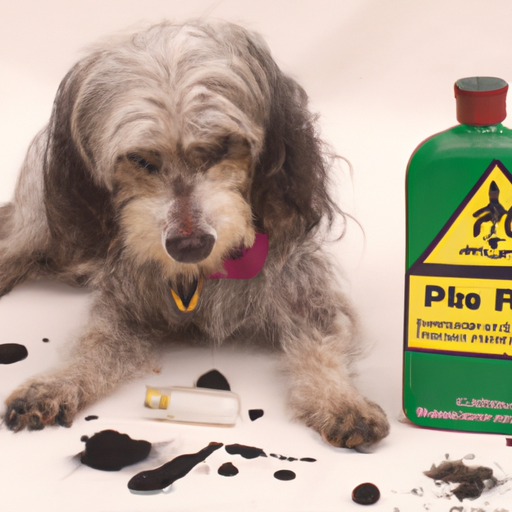What is Diphacinone?
Diphacinone is an anticoagulant rodenticide, commonly used to control rats and mice. It works by disrupting the normal clotting process in the blood, leading to uncontrolled bleeding. While it is effective in controlling rodent populations, it can also pose a risk to non-target species, including dogs.
Unfortunately, dogs are attracted to the bait used in rodent control products. If they ingest these products, they can suffer from diphacinone poisoning. The effects can be severe and life-threatening if not treated promptly.
The Toxicity Level of Diphacinone in Dogs
The toxicity level of diphacinone in dogs depends on several factors such as the dog’s size, breed, overall health, and the amount of diphacinone ingested. However, even small amounts can be harmful.
- Small dogs: as little as 0.025 mg per kg of body weight can cause poisoning in small dogs.
- Medium to large dogs: can tolerate slightly higher doses, but amounts greater than 0.1 mg per kg of body weight can still cause toxicity.
Remember, these amounts are estimates and any exposure should be considered a potential emergency.
Symptoms of Diphacinone Poisoning in Dogs
The symptoms of diphacinone poisoning in dogs can vary depending on the amount ingested and the time since ingestion. They may include:
- Lethargy or weakness
- Pale gums
- Blood in urine or stool
- Nosebleeds or bleeding from the mouth
- Difficulty breathing
- Swollen or tender abdomen
If you notice any of these symptoms in your dog, seek veterinary attention immediately.
Treatment for Diphacinone Poisoning in Dogs
Treatment for diphacinone poisoning in dogs involves several steps:
- Decontamination: This may involve inducing vomiting or administering activated charcoal to absorb any remaining toxin in the gut.
- Blood transfusions: In severe cases, blood transfusions may be needed to replace lost blood.
- Vitamin K1 therapy: This is the antidote for diphacinone poisoning and is usually given orally for several weeks.
- Monitoring: Ongoing monitoring is crucial to ensure the dog is recovering and not suffering from any complications.
Preventing Diphacinone Poisoning in Dogs
Prevention is always better than cure. Here are some steps you can take to prevent your dog from ingesting diphacinone:
- Keep rodenticides out of your dog’s reach.
- Monitor your dog while outside, especially in areas where rodenticides may be used.
- Use alternative pest control methods if possible.
- If you suspect your dog has ingested a rodenticide, seek veterinary attention immediately.
Frequently Asked Questions
1. How long does it take for symptoms of diphacinone poisoning to appear in dogs?
Symptoms may appear within a few hours of ingestion, but in some cases, it may take 2-3 days.
2. How long does it take for a dog to recover from diphacinone poisoning?
Recovery time can vary, but with prompt and aggressive treatment, most dogs can recover within 2-4 weeks.
3. Can a dog survive diphacinone poisoning?
Yes, with prompt veterinary care, many dogs can survive diphacinone poisoning. However, severe cases can be fatal, so immediate treatment is critical.
4. Are certain dog breeds more susceptible to diphacinone poisoning?
No, all dog breeds are equally susceptible to diphacinone poisoning. However, size and overall health can affect how a dog reacts to the poison.
5. What should I do if I suspect my dog has ingested diphacinone?
If you suspect your dog has ingested diphacinone, contact your veterinarian or a pet poison control center immediately. Do not wait for symptoms to appear.
Remember, your role as a caregiver extends to the health and well-being of your pets. Always stay vigilant and proactive in preventing any harm to your beloved companions.



